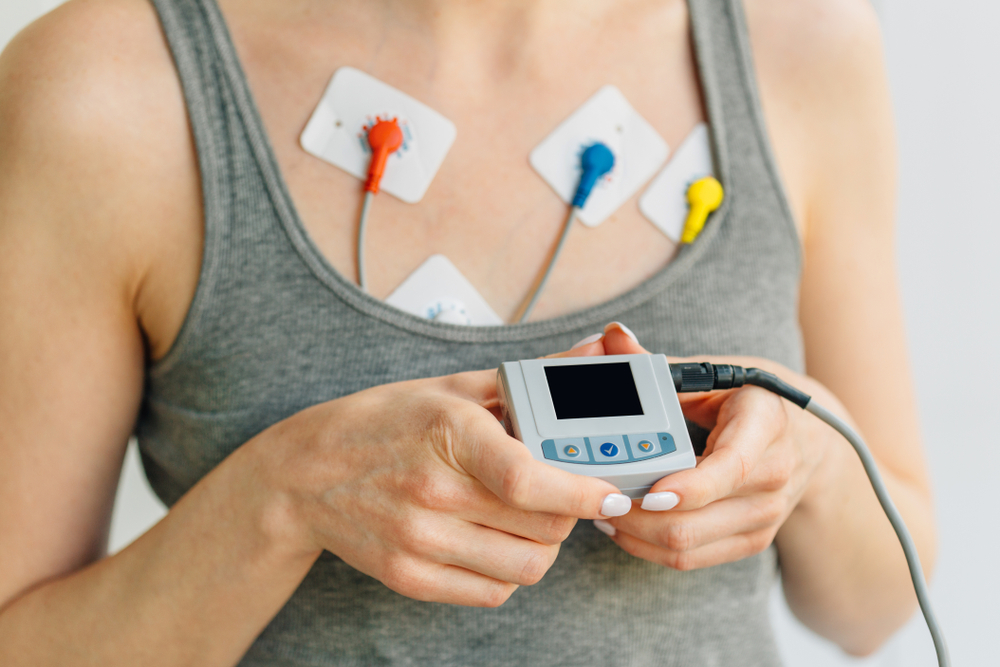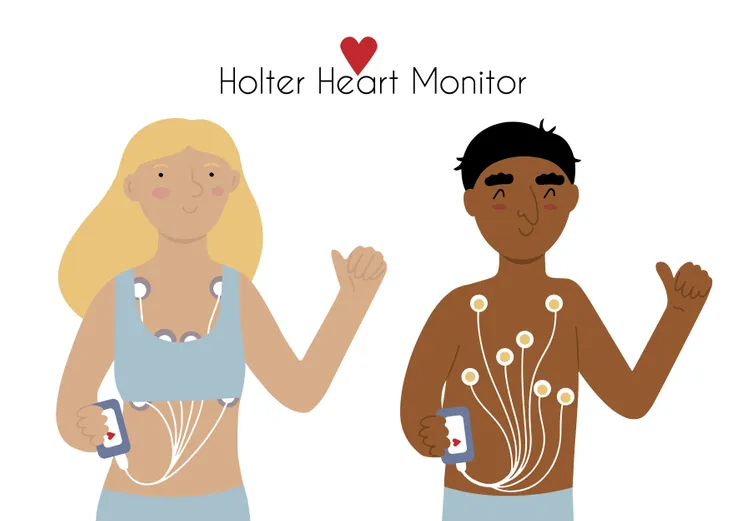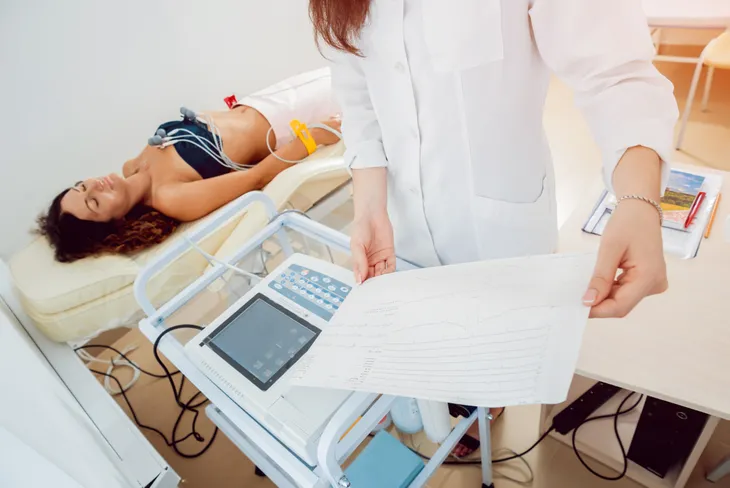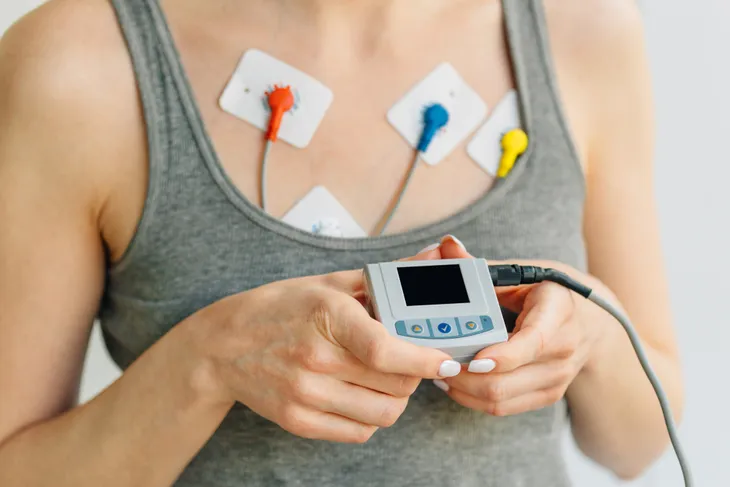- A Holter monitor is a small device that measures your heart’s activity.
- It can provide your doctor with valuable insight to help detect a heart rhythm disorder.
- Though you’ll have to wear it for 1- to 2-days, it’s non-invasive and can be hidden under your clothing.
Preparing for any medical test can be nerve-wracking, especially if it’s your first time. Plus the uncertainty and anticipation of the results can make the situation even more stressful. The best way to ease your mind is to get informed.
One common diagnostic tool is a Holter monitor, which measures your heart’s electrical activity, also known as your heart rhythm. Doctors may use it to help diagnose a variety of conditions, such as an irregular heartbeat or unexplained dizziness. If your doctor has recommended Holter monitoring, you may find comfort in knowing it’s a non-invasive, simple test. But there’s a lot more to know about it. Here’s a look at what a Holter monitor is, why it’s used, and how to prepare.
What Is A Holter Monitor?
A Holter monitor is a small device that measures your heart’s activity, including your heart rate and rhythm. The Cleveland Clinic says it’s named after Dr. Norman J. Holter who created the monitor in the 1950s. It’s an effective diagnostic tool that can provide your doctor with valuable insight into how your heart acts as you go about your day.
The monitor itself is very small, roughly the size of a cell phone. It’s also battery-operated and equipped with wires and electrodes that stick to your skin. The monitor is usually placed in a soft pouch that you wear around your neck.
Common Uses for a Holter Monitor
A doctor may recommend a Holter monitor for a variety of reasons. For starters, the Cleveland Clinic says it may be used if an electrocardiogram (ECG or EKG) is inconclusive. An EKG also only records for a short time so it may not provide enough detailed information.
A Holter monitor may also be recommended if you’re showing signs of a heart rhythm problem or unexplained dizziness or fainting. Johns Hopkins Medicine says it may also be used to help evaluate unexplained chest pain, to see how well a pacemaker is working, or to determine if treatment for complex arrhythmias is working.
What Can a Holter Monitor Help Diagnose?
The Cleveland Clinic says your doctor may recommend Holter monitoring to help identify the cause of certain health conditions such as heart palpitations, or arrhythmia (abnormal heart rhythm). It may also be used to help find the cause of unexplained dizziness.
The source also notes that a Holter monitor may be used to help determine if your heart is getting enough oxygen. All the information collected from the monitor can help your doctor diagnose and characterize disorders of the heart.
When Is a Holter Monitor Not Suitable?
While a Holter monitor is non-invasive and safe it shouldn’t be used if you’re showing signs of a medical emergency, such as a heart attack. Serious symptoms that require immediate treatment don’t require a Holter monitor. Luckily, the Cleveland Clinic says doctors “don’t recommend a cardiac monitor if it delays urgent care.”
The source also notes that a Holter monitor isn’t used for routine screening. It is only used if your doctor needs information to help diagnose a condition or to determine the cause of a condition.
Holter Monitor vs. EKG and Event Monitoring: What Is the Difference?
While a Holter monitor, EKG (electrocardiogram), and event monitoring all monitor aspects of your heart, there are differences between these diagnostic tests. For starters, the Cleveland Clinic explains that a Holter monitor records your heart continuously for 24- to 48-hours. But an EKG, on the other hand, “measures your heart’s activity at that moment in time,” while you’re having the test. An EKG won’t provide insight into if your heart rhythm changes throughout the day.
An event monitor also isn’t continuous. The source explains that it only records activity when you feel symptoms and activate the monitor. Which test you need will be up to your doctor.
Are There Any Risks With a Holter Monitor?
According to the Mayo Clinic, there are “no significant risks involved in wearing a Holter monitor.” That said, some people do experience minor discomfort or skin irritation in the spots where the electrodes are placed.
The source also points out that Holter monitors aren’t usually affected by other electrical devices but some may interrupt the signal from the sensors to the monitor. You may need to avoid electric toothbrushes, electric razors, electric blankets, and microwave ovens when wearing a Holter monitor. You may also need to avoid magnets and metal detectors, and keep cell phones at least 6-inches away from the monitor. Talk to your doctor to find out which precautions you need to take.
How to Prepare for a Holter Monitor
Preparing for any medical test for the first time can be scary, especially when you don’t know what to expect. But rest assured, you don’t have to do anything particular to prepare for a Holter monitor. However, you won’t be able to get the electrodes wet once they’re in place so make sure you shower before your appointment.
The Cleveland Clinic also says that the technician may need to shave your chest in the areas where the electrodes need to be placed. Before receiving the monitor, your doctor will explain what to expect and you’ll be able to ask questions.
What to Expect During
Once you arrive at your appointment, the technician will begin attaching electrodes (which are small round patches) to your chest in different areas. The electrodes have a sticky adhesive that sticks to your skin. As we mentioned, they may need to shave your chest to help the electrodes stay in place.
Next, the electrodes are connected to wires which are then connected to a Holter monitor which records the information. The monitor is fairly small and can be worn in a pocket, or they may provide you with a strap with a pouch that you can wear around your neck. The electrodes, wires, and monitor can all be hidden under your clothing.
The technician may also tell you to keep a symptoms journal while wearing the monitor. Make note of symptoms you experience throughout the day (such as shortness of breath or chest pain) and what you were doing when they happened.
Once you’ve been fitted with the device, the technician will provide instructions on how to wear it and then you can go about your day. You can expect to wear the device for 24- to 48-hours. Your doctor will decide how long you need to wear the monitor.
What You Can’t Do While Wearing a Holter Monitor
You can’t get the electrodes or monitor wet which means you can’t bathe, shower or swim. If you work out regularly you may want to take a rest day or alter your routine to prevent too much sweating.
The Cleveland Clinic also says you can’t have an X-ray while wearing the monitor or go near a high-voltage area or metal detector. Luckily, you can go about your normal daily activities.
 Shutterstock/MIA Studio
Shutterstock/MIA StudioWhat to Expect After Wearing a Holter Monitor
Once the monitoring period is over, you’ll return the monitor to your doctor’s office or hospital (wherever you received the monitor). If you were asked to keep a symptoms journal, don’t forget to hand that in too. The information recorded by the Holter monitor and your symptoms journal can provide your doctor with valuable information.
Next, all you have to do is wait for the results. It’s also worth noting, some sticky residue may remain after the electrodes are removed but this should wash off in the shower.
How Long Do Results Take?
According to the Cleveland Clinic, the results from a Holter monitor typically take 1- to 2-weeks. Once the results come back, your doctor will discuss them with you.
The source says the results from the monitor may detect a heart rhythm disorder such as atrial fibrillation, bradycardia, tachycardia, or premature ventricular contractions (PVCs). Based on the results, your doctor may recommend further testing, or treatment strategies (such as heart medications or a pacemaker) if a condition is detected.
Questions to Ask Your Doctor
Medical tests can be nerve-wracking but we hope this overview of a Holter monitor has helped ease your mind. Though it may be a minor inconvenience, this non-invasive test can provide valuable information for your doctor. If your doctor recommends Holter monitoring, the Cleveland Clinic suggests the following as great questions to ask your provider ahead of your appointment:
- Why do I need the Holter monitor?
- How long will I need to wear the Holter monitor?
- How long do results take?
- Will I need other tests after the Holter monitor?














